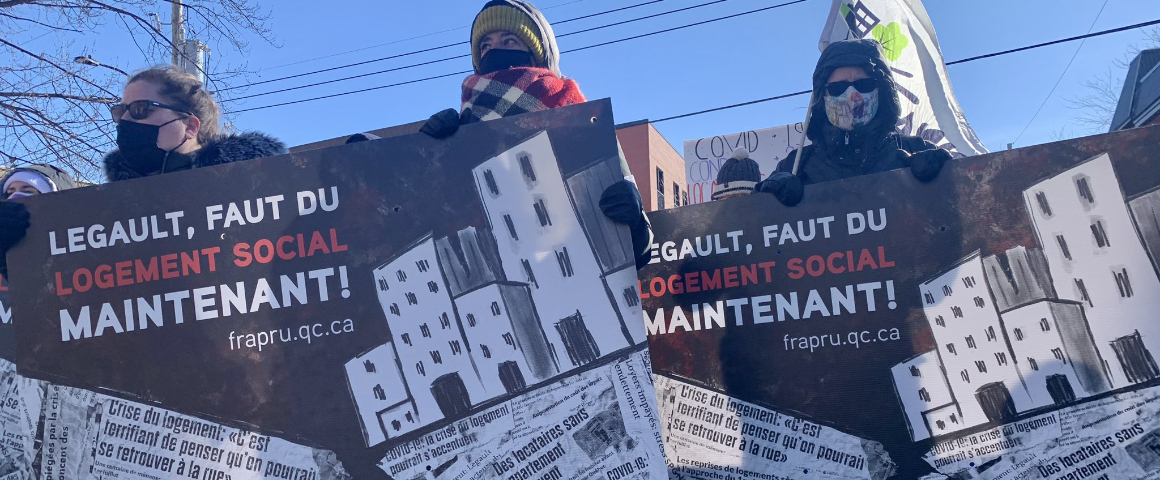By Ivan Stoiljkovic
Most people think that the issue with social services is that they are underfunded. So it is with housing, with all the bourgeois parties in the federal election campaign promising to invest more money in housing. Progressives are calling for spending on the military and police to be diverted into housing and services for the poor. Many commentators are praising government-funded housing developments as “good, but too little.”
A scratch beneath the surface, however, reveals a deeper and more troubling picture. The billions invested in housing by all levels of government are not only failing to alleviate the housing and homeless crisis but are actually helping to create and sustain it by contributing to the perpetuation of the market mechanism which is the engine behind the housing unaffordability crisis. In Kingston, Ontario the Mayor’s Task Force on Housing is dominated by developers and landlords. In accordance with the city’s already existing neoliberal official plan, which calls for building of “a significant number of new residential units with a range of affordability,” the task force found that the solution is to encourage more development of privately-owned and market-priced housing.
Municipal projects across Ontario vary from Belleville’s recent $50 million investment in constructing new privately-owned market-rent buildings, to money for land trusts which tend to spread ownership in some kind of co-op form while providing “affordable” (rent-geared-to-market) units. All these channel millions of dollars into the pockets of private landlords and developers, and encourage market forces and inflation of land values, while leaving out of the equation those in real need of housing – the homeless and people on welfare or disability pensions, whose names are on the ever-growing social housing registry lists.
Over the years, Canada Housing and Mortgage Corporation (CMHC) has changed its definition of what constitutes “affordable housing.” The 1938 National Housing Act recognized that rent should cost no more than 20 percent of a family’s income. In 1964 this changed to 25 percent of household income, and in the 1990s it increased to 30 percent. Since then, CMHC has de-indexed the meaning of “affordable” from income and, instead, indexed it to market prices – first at 60 percent of market prices and soon afterwards to 80 percent. The current definition allows for virtually any rental housing to be considered affordable, under the implicit understanding of supply-side economic dogma.
Governments and bourgeois parties have signed onto this neoliberal understanding of housing policy, which is essentially Reagan-style supply-side economics, with all calling for an increase in supply of housing as a solution to the housing and homelessness crisis. The difference between the right-wing Conservative platform which calls for building 1 million new housing units and the supposedly left-wing NDP’s call for constructing half that number of “affordable” units (over 10 years!) is very small considering the fact that “affordable” at this point means market-priced or geared-to-market-rent. These parties also all heavily promote some form of housing-ownership scheme, which contributes to encouraging the market forces and is only a hand up to those who are privileged enough to already be in a position to buy.
CMHC’s focus on funding shovel-ready new builds favours development corporations and encourages more destruction of the environment while continuing to neglect much more people-oriented and environmentally friendly options. These options include investing in existing publicly owned and rent-geared-to-income (RGI) housing and expropriating the abandoned, unused and empty units and buildings found across our cities.
Transforming public housing authorities into purveyors of “affordable” and market rent housing has also taken the toll. Vacated RGI units have been turned into market-rent units in an attempt to generate revenue for the housing authorities which, run top-down by executives with experience in the private sector, have stopped asking for government funding and signed onto these market-driven models which leave more and more people behind. Words like “sustainable” are thrown around but are meaningless without long-term strategies. Housing corporation managers are answering calls for publicly owned RGI housing with questions about the ability to secure “sustainable” government subsidies.
In Kingston, the Social Housing Registry rules have been recently changed to force people into accepting RGI units in private sector or be thrown off the waiting list. These unregulated and often unlivable units – with no hot water and infested with bed bugs or rats – are so bad that some people have chosen homelessness instead.
The good news is that tenant groups across the country are catching onto governments, who are now forced to defend their policy rather than have it accepted as gospel. All the “innovative” schemes to avoid investing in public RGI housing are being challenged by housing advocates and tenant groups. Increasingly, this movement is realizing that sole reliance on reactive “direct-action” resistance is insufficient because it leaves the solutions in the hands of existing governments. The various ways in which governments have adapted to the calls for more housing need to be interrogated, exposed and challenged.
In Kingston, the Katarokwi Union of Tenants has recently come out with policy statements explaining the root causes of the abysmal state of the public housing stock, as well as the concurrent gentrification scheme to reduce the amount of rent-geared-to-income public housing stock and replace it with “mixed” housing (privately or even publicly owned but market-priced and therefore unaffordable). The union is calling for investment in and democratization of the Public Housing Corporation as well as the dismissal of the current CEO. The group is planning to organize a mass rally in the near future.
[Photo: FRAPRU Twitter]
[hr gap=”10″]
Get People’s Voice delivered to your door or inbox!
If you found this article useful, please consider subscribing to People’s Voice.
We are 100% reader-supported, with no corporate or government funding.




